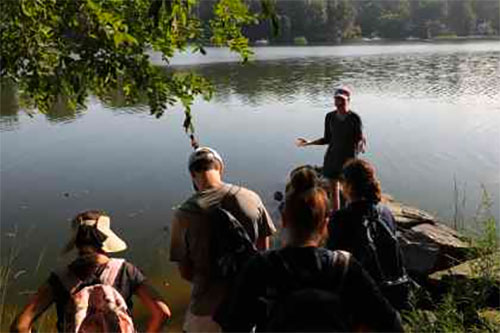First Year Food Lessons
August 21, 2019
From forest to field, and farm to table, students studied foraging, fermentation, and learned how to create soil using food scraps in a zero-waste approach to cooking and living.
During Permaculture Orientation with the Food Initiative, students in the Class of 2023 explored how an understanding of nutrition and diet can lead toward ecological harmony, as consciousness of food becomes a consciousness of the environment in which we are embedded.
From forest to field, and farm to table, students studied foraging, fermentation, and learned how to create soil using food scraps in a zero-waste approach to cooking and living. Guided by Shane Brill '03 M'11 and Naturalist Kathy Thornton '13, students began their journey along the shores of the Sassafras River to talk ethics and ecology. They looked closely at details in the environment to observe patterns, and applied their observation to forage for wild fruits and leaves.
“I used to think that wild foods were essentially foods that we would buy in grocery stores, but were smaller. Like wild raspberries, crab apples,” says Jack Goembel '23. “Now I realize that there's an extreme variety of foods outside that looking nothing like what we see in the stores and I wouldn't have known they were food otherwise.”
Cattails and lotus were on the wild menu, as were grapes, a variety of flowers and greens, and sumac. “Eating wild sumac was bizarre. I've never eaten something like that — I guess it wasn't even really eating, more like sucking sour oil off of a hairy seed. It surprisingly tasted citrus-y and strong,” says Goembel.
They ventured to the marshes of Eastern Neck Island, collecting pears and studying native flora and fauna. They discussed permaculture principles and focused on interacting with the natural environment, becoming a participant with nature rather than observers. Their journey continued by meeting Washington College's Director of Sustainability Greg Farley, to understand the context of campus environmental initiatives, as well as Figg's Ordinary owner Ingrid Hansen P'14, to find out about her zero-waste philosophy and approach to increasing community access to healthful food.
The group toured Calico Fields Lavender Farm and spoke with Jay Falstad about the role of small-scale diversified agriculture and organic practices to provide habitat for pollinators, which ensures food for humans. After a picnic lunch at Unicorn Lake to review more permaculture principles, their imaginations plumbed the depths and diversity of the human microbiome as they learned how to make fermented foods including yogurt, sauerkraut, kefir, and kombucha. Afterwards, they rolled nixtamalized masa into tortillas that they pressed and cooked into nutrient dense tacos filled with food procured from local farms.
“I was impressed how little sugar was in all our final products, and that they still tasted so good,” remarks Goembel. “I was also impressed by how much of our food was fermented! I'd love to continue to be involved in Food Initiative programs.”
On their final day of the Permaculture Explore program, the students used food scraps from dinner to begin the process to make compost at the campus garden. Joined by their faculty advisor Dr. Nick Garcia, they gathered comfrey leaves to turbocharge the new compost pile and designed an aquatic container garden with a variety of plants generously donated by Kingstown Farm, Home, and Garden.
The importance of soil health and holistic food production practices was underscored by a visit to Oksana Bocharova, who provided a tour of her farm and explained her methodology for healing the land while growing excellent food for the community. A production team from Voice of America was on hand to make a documentary about Bocharova, and they interviewed Brill, Thornton, and Garcia about food access and literacy.
In exploring all dimensions of eating like humans, Permaculture Explore program concluded with sweet reflection over locally produced ice cream at Lockbriar Farms.
